If you think Aruba is like any other tropical island in the Caribbean, you are partially correct. Yes, Aruba has tranquil blue waters, white-sand beaches, and warm temperatures, but it misses one feature. Aruba does not have the humid, lush, green vegetation that other islands like St. Thomas, Dominica, or Grenada have, and Aruba is more of a desert reminiscent of a moonscape. The best way to explore this unique island is on an Aruba jeep tour.
In the 1600s, the Dutch settled Aruba after capturing it from the Spanish. Aruba is located just 30 km north of the Paraguana Peninsula in Venezuela. The Dutch Caribbean consists of Aruba, Bonaire, and Curacao. They are also known as the ABC islands.
Flights to Aruba are common in the winter months from North America as Aruba’s climate is an attractive escape from the snow and ice. Increasingly, many cruise ships have added Aruba as part of a longer itinerary from their Florida-based operations. Aruba is an attractive destination from elsewhere in the world due to its uniform temperature year-round and lack of a rainy season.
Aruba is an Arid Island
Whether you arrive in Aruba on a cruise port of call or decide to book an extended stay on this arid island, you will quickly discover that this island’s feeling is significantly different from any other in the Caribbean. It is dry, sparse of vegetation, and can be dusty. There are also several types of cacti growing throughout the city of Oranjestad. To me, this was the most surprising sight upon arrival.
If you have researched some of the things to do in Aruba, you will have learned that in addition to the spectacular beaches that dot the coastline, most of the island’s interior is a desert! And how to best visit some of the different areas of the desert than on an Aruba jeep tour.
Tip: Dress lightly. It usually gets quite hot. Don’t forget your sunhat and sunscreen!
What is an Aruba Jeep Tour?
A jeep tour in Aruba is a guided tour of the island. Before you start thinking about how much you hate guided group tours, let me tell you that this type of tour is not like most others. First of all, they are all small group tours, to a maximum of 16 passengers, and the best operator in Aruba is De Palm Tours.
You will be riding in an open-air 4WD vehicle with open sides and a canvas roof to protect you from the sun. There are seatbelts, and De Palm Tours is very safety conscious about everyone having a properly fitting seatbelt. Although seat belt extenders are available, larger passengers will not be comfortable due to the limited legroom and the rough terrain of the Aruba jeep tour.
The Aruba jeep tours take you to some of the most beautiful and exciting historical spots on the island. Without the off-road capabilities of the jeeps, getting too many of these attractions would be challenging. The terrain is very rough and unforgiving, but the scenery is spectacular. Having a trusted guide to lead the Aruba jeep tour makes all the difference.
Starting the Aruba Jeep Tour
If you are staying on the island and wish to book a jeep tour, I suggest the Baby Beach Off-Road Safari for a full day excursion (7hrs) or the Natural Pool Off-Road safari (4hrs) for a shorter tour.
If you are arriving by cruise ship, you are best to book the excursion directly with your cruise line as De Palm tours can accommodate large numbers of patrons and adjust itineraries based on cruise arrival times in port.
You might be interested in this Cruise Planning Checklist Bundle
Planning a cruise is made easy with this Cruise Planning Checklist Bundle. It has everything you need to keep you well organized. From Pre-planning to Budget Planning, Excursion Planning, and a variety of Checklists, you will have the tools to plan and enjoy your cruise.
When you arrive at the designated area at the cruise port terminal, De palm tours will direct you to a large bus. Don’t worry; this is not your vehicle. It will only transport you to the local tour fleet area, where you will be separated into smaller groups.
Once in your smaller groups, you will be assigned a driver/guide. They will explain the basic safety protocols of the tour, have you sign the waiver, and provide you with a water bottle to ensure you are kept hydrated during the Aruba jeep tour. Your guide will then assist you into the vehicle as the two steps up to the bench seats are very narrow and steep. Once in the vehicle, your seatbelt must be fastened at all times; a reminder that this will be a rugged jeep tour, and the jeep has no sides!
Once the jeeps were loaded with passengers, we exited the staging area, where the jeeps all headed in different directions to not crowd any one attraction on the island.
Casabari Rock Formation
Our tour started at the Casabari Rock Formations, a short drive out of the city. Clusters of geological rock formations rise from the surrounding desert terrain to add relief to the landscape and create an unusual setting. The government of Aruba has made walking trails and steps throughout this rock garden, thus allowing hikers to climb to the top and obtain breathtaking views of the island. The views from here are stunning!
Baby Natural Bridge
After a short drive, we head towards Aruba’s north coast. This coast faces the deep blue Atlantic Ocean. There are rocky beaches on the coast as well as coral plateaus and small coves. We head towards the Baby Natural Bridge formation.
In 2005, there was a more significant natural bridge formation, but it succumbed to the rigorous pounding of the waves and wind and collapsed into the ocean below. An intact “baby” natural bridge arch carved out of rock and coral now serves as a memorable photogenic attraction for nature and wildlife lovers, as well as photographers.
Bushiribana Gold Mine Ruins
Our next stop along this bumpy Aruba jeep tour was at the Bushiribana gold mine and Balashi gold mill. There is a lively history of gold prospectors in Aruba’s heritage. Legend has it that back in the 15th, and 16th centuries, the Spanish believed that these mines held hoards of gold. Unfortunately, at the time, very little of this precious metal was found, and the mine was abandoned.
However, in 1824, gold was discovered nearby. The smelting plant was built in 1872. It was used to extract the gold for the next ten years until it was depleted. Today the plant looks almost medieval in appearance. You are welcome to go and explore the ruins at your risk. Be aware that the rocks getting onto the mine are pretty loose.
At one point, the island’s original inhabitants (the Arawak Indians) believed that these formations were sacred due to the unusual designs and sense of tranquility.
Arikok National Park
Covering approximately 20% of the island is the Arikok National Park. This is the part of the Aruba jeep tour that is the most unique. From inside your open-air jeep, you are continually tossed and thrown about for the next hour or so. There is a great deal of geological variety in the park. The main aspects are fossilized coral’s rough hills of the volcanic Aruba lava formations. Make no mistake; this is a wild ride! This National Park area is known as the outback of the island. Vegetation includes divi-divi trees and cacti.
This is the most challenging and fun part of the tour!
You are almost relieved with the flatter, more desert-like terrain coming out the other side of the park.
Alto Vista Chapel
Driving towards the island’s northern part, the Aruba jeep tour heads towards the Alto Vista Chapel. As you approach the chapel, crosses line the winding road. This brightly painted yellow chapel is atop a hill on Aruba’s north shore. Built in 1750 by the Santa Ana de Coro Indians, this chapel dates back to the Spanish era. It became the first Catholic Church in Aruba. In 1952, it was rebuilt and was presently known as the Pilgrims Church. It is a special place for peace and contemplation, and it looks so cheerful in the middle of the desert.
California Lighthouse
Next on the Aruba jeep tour is the California Lighthouse. The stone lighthouse was constructed in 1910 and named after the steamship S.S. California, a wooden sailing ship that sank near shore. Around the lighthouse are acres of stoned-filled flat land and an area called California White Sand Dunes. This is a popular area for local kids to have some fun.
As the lighthouse sits higher than the surrounding land, the island and coastline views are amazing! There is a restaurant at this attraction if you require a restroom but be forewarned that you will be required to make a small donation to enter. Bring some $1 just in case.
Eagle Beach
Many tours will stop at Arashi Beach as it is a powder-soft white sand beach and is superb for swimming/snorkeling, but there are no facilities. Our group chose to continue south along the coast and spend our remaining tour time at Eagle Beach.
Eagle beach is one of the best beaches on the island as it faces west and has spectacular sunsets if you are on the island that late in the day. There are several places to rent watersports equipment, chairs, and umbrellas. Small snack bars are also available for your drinks, as are restroom facilities. (PS. There is also a $1 fee to enter the restroom and frequent line-ups.) On another note, certain beach areas do drop off quickly, so if you have weak swimmers or children, be mindful of their whereabouts.
After getting back in the jeeps, our Aruba jeep tour took a quick visit through town on our way back to DePalm Tours base.
Busses were boarded, and we were taken back to the cruise ship terminal to enjoy the rest of the day in Aruba.
Although it was a jam-packed day, it felt like we got a complete experience of what this tiny little island has to offer? I would highly recommend DePalm tours for any Aruba jeep tour!
Extra Tips for the Aruba Jeep Tour
Be sure to bring extra water and sunscreen, the sun is scorching on this island, and the constant wind from the ocean will dehydrate you very quickly.
Dress comfortably in proper running shoes, and be sure to think of potential sunburn.
Don’t bring anything valuable or that you don’t mind getting dirty. It’s an open-air jeep After all!
If you are headed to the southern Caribbean, you might also be interested in where to find the best beaches in St. Thomas, things to do in Grenada, or what the snorkeling is like in Bonaire.

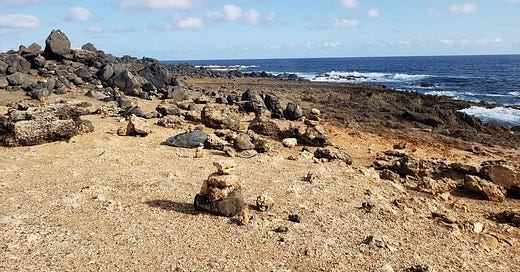



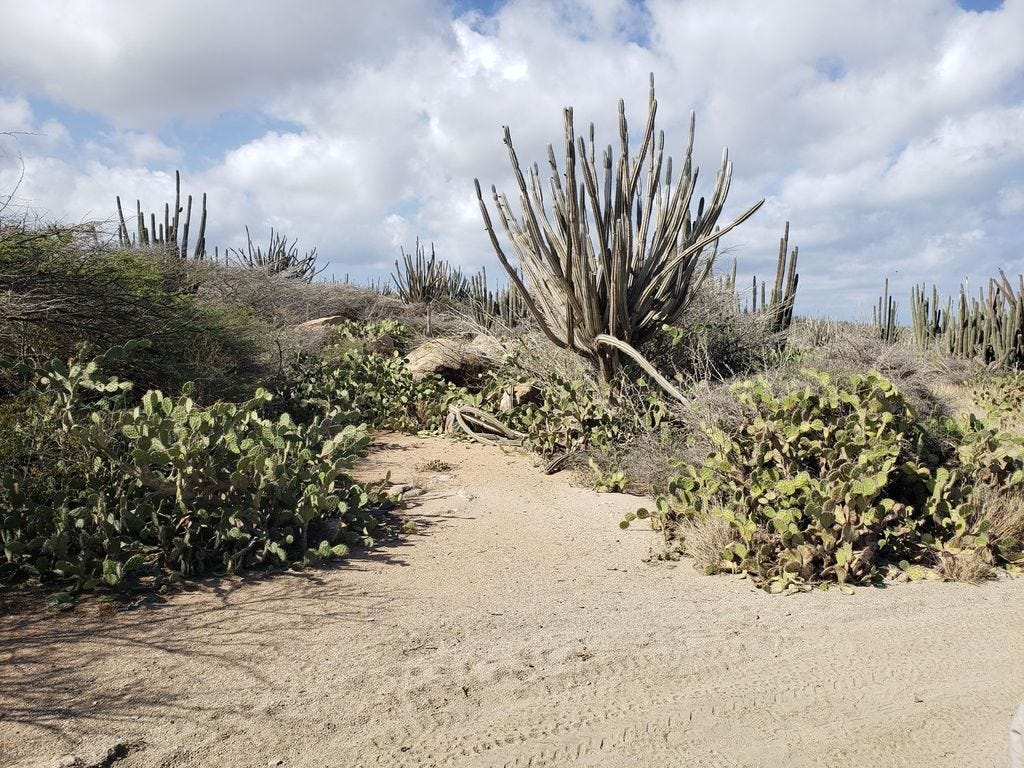
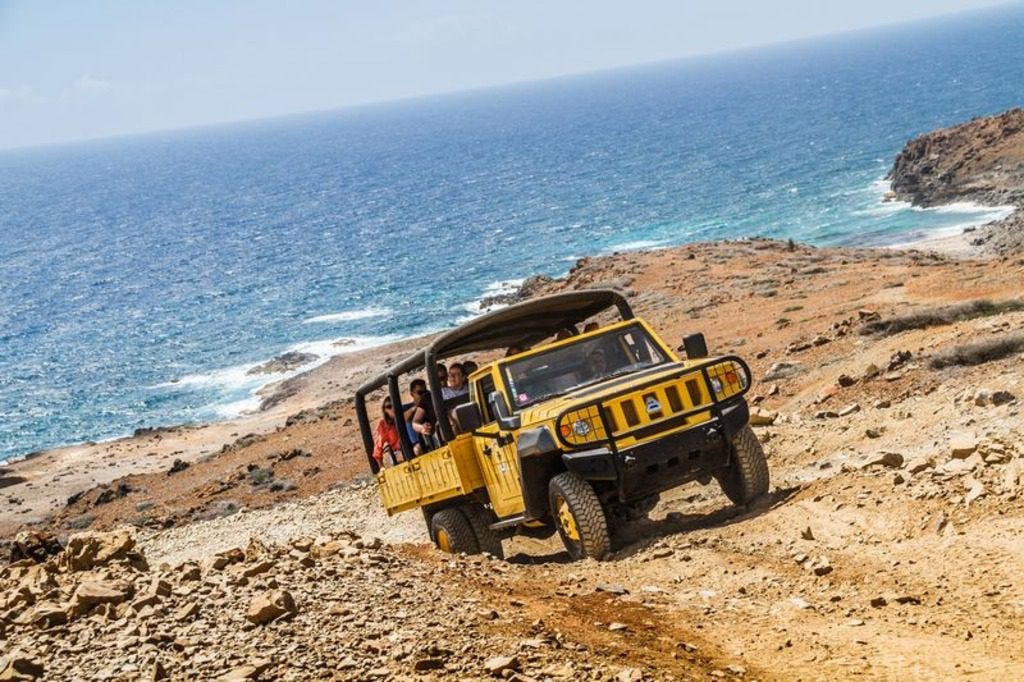
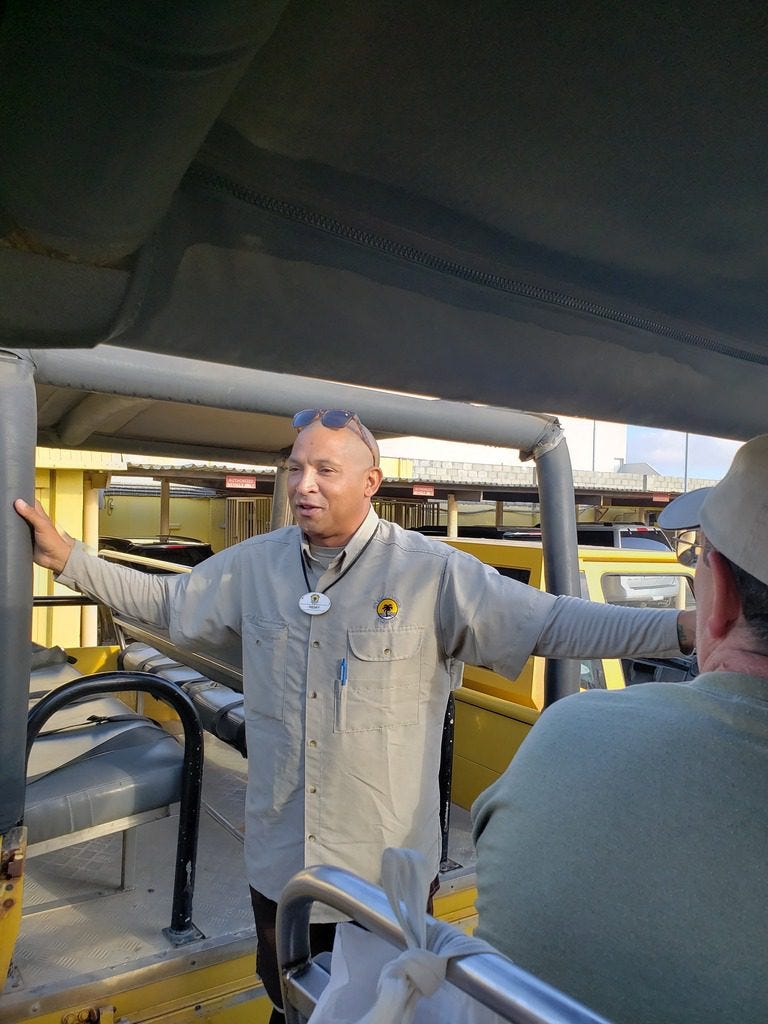
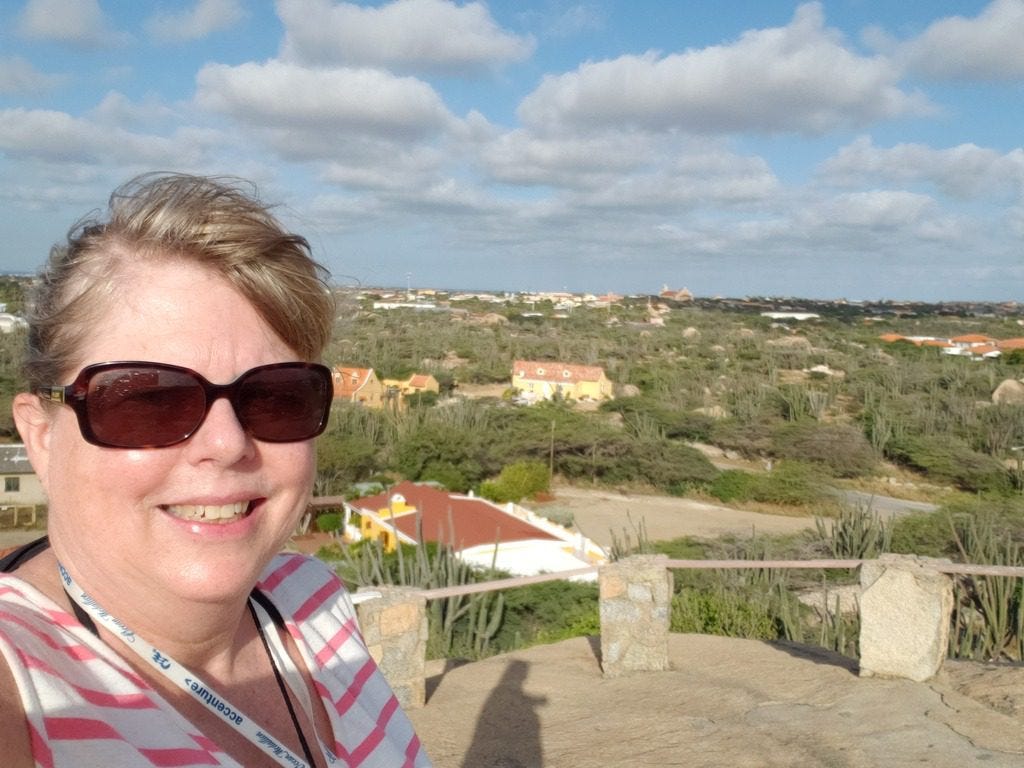
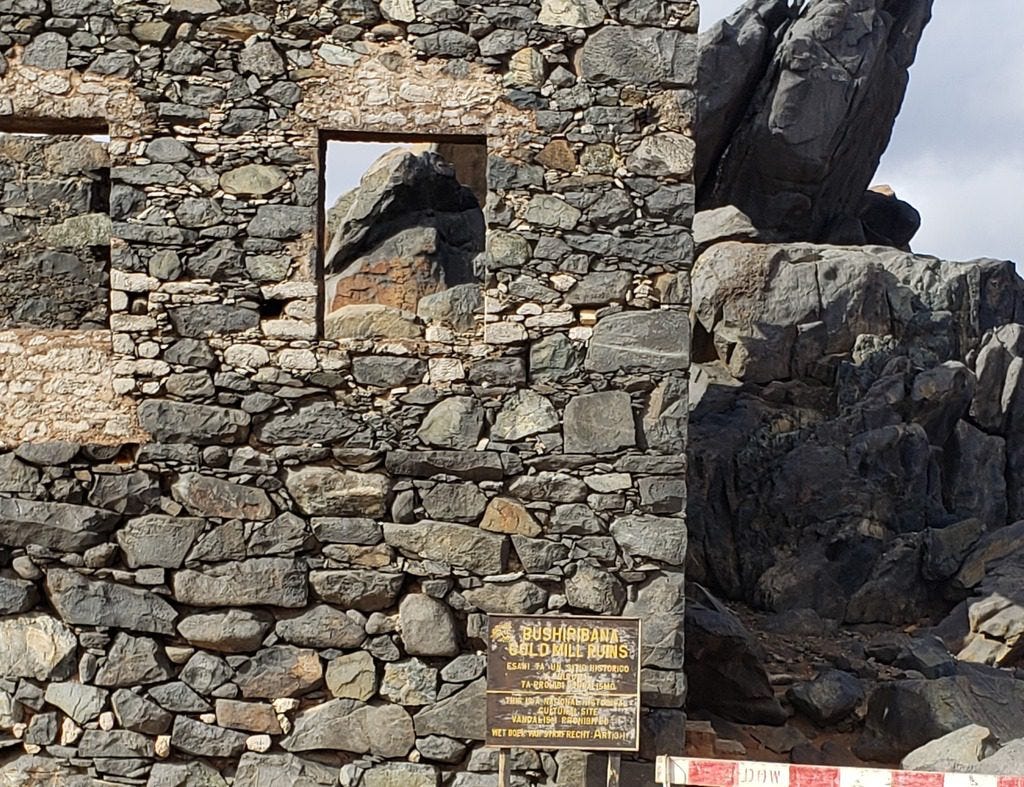
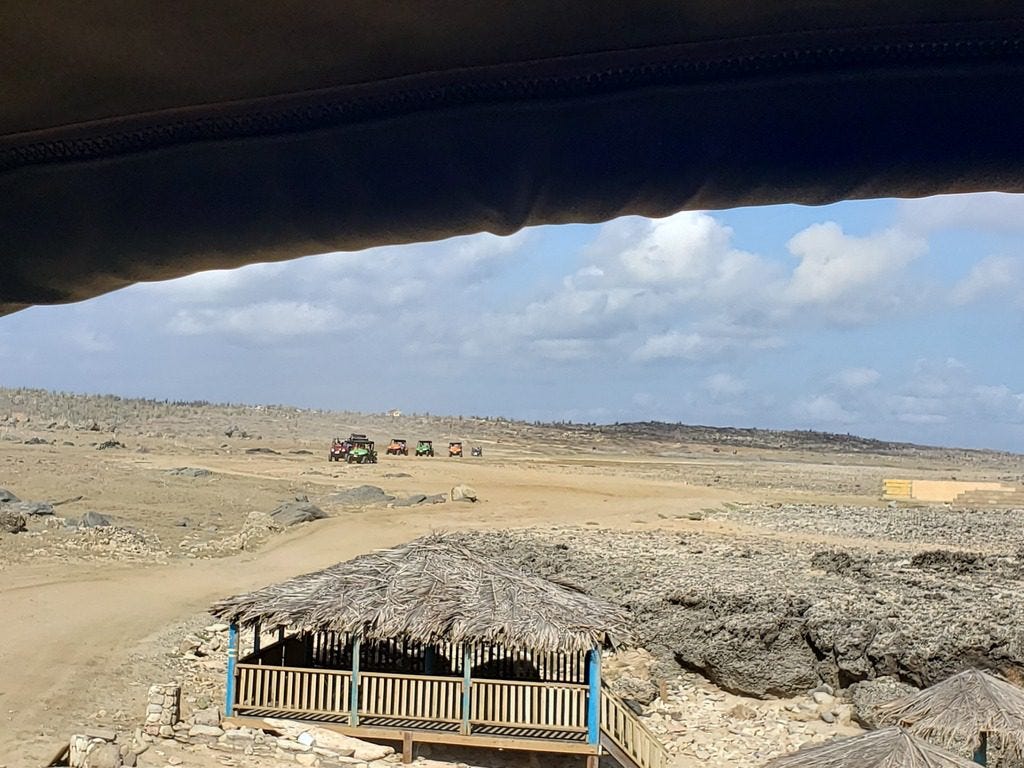

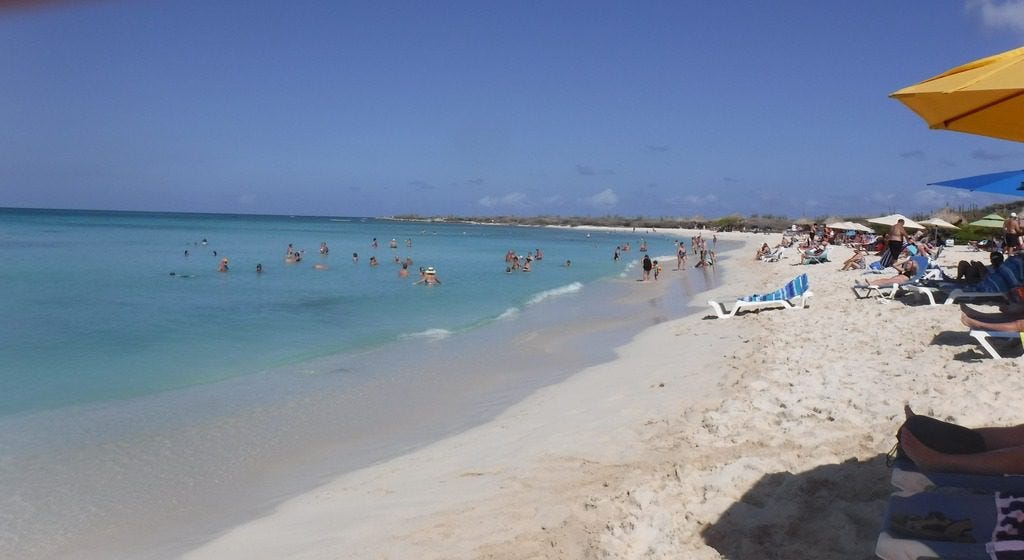
Aruba - the name alone has that kind of mystic to it that can beckon any traveler to set foot on this island. I have learned of Aruba awhile back but never thought of it as an arid place in the Carribean. That instead of swaying palm trees, one gets to enjoy a moon-like terrain and there's no better way to see and experienced the island but on a jeep. #flyingbaguette
I had no idea that Aruba has a primarily desert landscape. It certainly has an otherworldliness to it. A jeep tour looks like the perfect - and exciting - way to explore the island. It's nice to see that not only do you explore the landscape, the tour also takes into account historic locations, such as the old gold mines and the lighthouse.